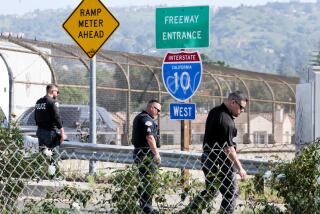SAT, ACT cheats face no penalty
A group of students at a Los Angeles high school is suspected of cheating on the ACT college entrance exam by paying a former student, who used fraudulent identification, to take the tests. The testing agency recently began investigating the claims, which could result in cancellation of scores provided to colleges.
But those colleges will not be told why the scores are invalid, nor will the students’ high school be clued in.
In all likelihood, the students will simply retake the test with few consequences, the result of a little-known policy by the ACT and the College Board, which owns the rival SAT, to keep such irregularities confidential. Each year, millions of stressed-out students take the two tests, hoping a good score will secure them a spot at the nation’s top colleges.
But most students know little of what occurs when a score is in dispute. And the policies of the two nonprofit test companies seem to satisfy no one. Some complain that scores are arbitrarily canceled without evidence, while others criticize the companies for giving a free pass to cheaters.
If a score is invalidated, colleges receive a fairly generic alert like this one sent recently to UCLA:
“The ACT cancels scores for a variety of reasons, including illness of the examinee, mis-timing of the test, disturbances or irregularity at the testing site. . . . It is the ACT policy to treat the ACT’s reasoning for canceling a specific score as confidential.”
The agencies say their only concern is the integrity of scores, and that it would be impractical to expose student cheaters or try to exact punishment, such as barring them from retaking the test or noting infractions on transcripts.
“We don’t tell schools or anyone else; we simply cancel the score,” said ACT spokesman Ed Colby. “What we’re trying to do is make sure the scores that we send to colleges are valid. It’s not our intention to go around punishing students who make mistakes or who’ve done something they shouldn’t have done.”
The Educational Testing Service, which administers the SAT for the College Board, had a similar response.
“The SAT does play a very important role in the college admissions process, and to prohibit somebody from taking the test . . . that might hinder their educational future, seems a bit extreme,” spokesman Tom Ewing said.
But critics assert that such evasions let student cheaters off the hook.
“Their position is thoroughly unaccountable and promotes unethical conduct,” said Michael Josephson, president of the Los Angeles-based Josephson Institute of Ethics. “What they’re basically saying is ‘Try it. You have nothing to lose.’ Why not say to someone who robbed a 7-Eleven, ‘Please give back the merchandise or pay for it, but we don’t want you to feel bad about stealing.’ ”
He argued that the stakes are much higher than just invalidated test scores. With students spending hours preparing for the exams and their parents paying for tutoring, the exams remain important factors in college admission, even though some colleges have stopped requiring them.
“If you put up for auction a guaranteed spot into Harvard or UCLA, people would pay tons of money -- that’s how much they’re stealing when they falsely get a place they don’t deserve,” Josephson said.
According to the two companies, cheating on the tests is relatively rare and prompts only about 2,000 investigations on average out of the more than 3 million tests administered each year. Most cheating accusations come from students or exam proctors and typically involve a student copying from another’s exam.
In a recent high-profile case of cheating on Advanced Placement exams at Orange County’s Trabuco Hills High School, students came forward to alert test officials to the use of cellphones and other irregularities. Ten students acknowledged cheating, but the school is catching heat for not providing adequate supervision.
And many students and parents are angry with the ETS and College Board for deciding to cancel the scores of all 385 test takers.
Students can cancel SAT or ACT scores for any reason. If the agency challenges a score, students can retake the test -- usually without charge -- in a more controlled setting, provide information to explain why the original score is accurate, or retake the exam the next time it is given.
Some high schools act on their own to punish students whose scores have been canceled, sometimes with suspensions if they admit to cheating.
But the head of the private Los Angeles school whose students were identified as being under investigation by the ACT said he was unaware of the incident and when he heard about it and contacted the company, officials there would not confirm it. The school is not being identified because there is no proof of wrongdoing by its students.
Colleges also may question students whose scores have been canceled. With 50,000 applications each year, UCLA receives only a handful of SAT or ACT score cancellations, Admissions Director Vu Tran said.
“When we receive notification from the ACT or SAT, the first thing we do is check to see if the student will admit to cheating,” he said. “We give the students all due process. But, of course, if the [agency] was specific and spelled it out, it would be a lot easier.”
Cheating on high school and college campuses is not uncommon. A survey by the Josephson Institute, for example, found that 60% of high schoolers reported cheating on an exam during the preceding year.
Donald L. McCabe, a Rutgers University professor who has studied cheating, said college-bound students perceive that because of the use of proctors and seating arrangements, fraud on the SAT is difficult -- although many say they would try if they thought they could get away with it.
McCabe said the test companies may be reluctant to take action against cheaters because they fear being sued. But Ewing said that was not so.
“We could stand behind whatever investigative results we come up with,” he said. “We’ve had instances of students taking us to court, and we have prevailed. For us, it’s all about the confidentiality.”
Students taking the two tests sign confidentiality agreements and promise not to misbehave, but most are unaware of the testing agencies’ policies -- and most professional tutors are not eager to let them know.
“I’ve known about this for 25 years but did not believe it served anybody’s interest to be told there were no consequences for cheating on tests,” said Paul Kanarek, president of the Princeton Review of Southern California. “It’s not the right ethical message to send.”
For some critics, the issue is not cheating but the imbalance of power between the test agencies and students. Students must put in time and effort to retake tests and those who are cleared of cheating may nevertheless remain suspect.
“The test giver investigates, prosecutes, judges and acts as jury and can withhold test scores,” said Robert Schaeffer, public education director at FairTest, a Massachusetts-based group that promotes fair and open testing. “There’s no way to be sure who’s right.” --
More to Read
Start your day right
Sign up for Essential California for news, features and recommendations from the L.A. Times and beyond in your inbox six days a week.
You may occasionally receive promotional content from the Los Angeles Times.







